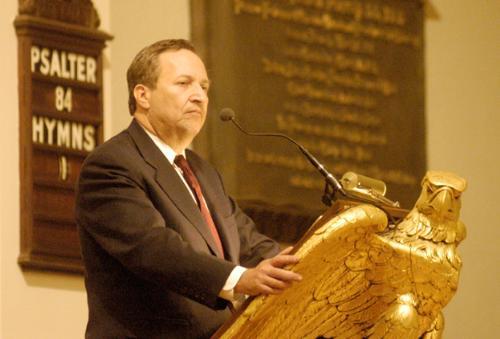
University President LAWRENCE H. SUMMERS, above speaking in Memorial Church Feb. 2, has spoken out against vnti-Semitism.
Tom Paulin is a world-renowned poet.
He is also known for expressing controversial views toward Israel in his work and in the public forum—referring to the Israeli military as the “Zionist S.S” in one of his poems, and calling the nation a “historical obscenity.”
And when the Department of English invited Paulin to give the annual Morris Gray lecture this March, many within the University objected to the idea of offering the poet the honor of speaking at Harvard.
After protests, meetings, and the exchange of several opinions which weighed controversial speech against cultural sensitivity, Paulin’s invitation was rescinded and then reinstated.
Paulin incited heated debate across campus, but the incident was only one of several major episodes this year in which the right to free speech was tested.
However, while this year’s battles over free speech were always accompanied by emotionally-charged arguments, for the most part the principle of free speech emerged battered but intact.
Effect v. Intent
Morning prayers at Memorial Church are meant to be a quiet time for the University community to reflect.
But in September, a morning prayers speech delivered by University President Lawrence H. Summers quickly moved from quiet reflection in the Memorial Church into angry debate across campus and on the editorial pages of national publications.
In the short talk, in which he said he was speaking not as a president but as a private citizen, Summers addressed the topic of anti-Semitism on campus.
He referred to a petition signed by faculty and students urging Harvard to divest its financial assets from Israel, as well as a plan by the Harvard Islamic Society to donate money to the Holy Land Foundation—a plan the group aborted when it was learned that the Holy Land Foundation was suspected of having ties to the terrorist group Hamas.
Summers referred to these and other events as “anti-Semitic in their effect if not in their intent.”
He said repeatedly that this was his personal opinion, but he received criticism from members of the Harvard community who said they were upset that the president had not distinguished between critical political viewpoints and true anti-Semitism.
“To lump people who are working for peace in Israel with racists is really unfair,” Professor of Philosophy Richard G. Heck said at the time.
Supporters of the divestment movement said that criticizing the political policies of Israel fell within their right to free speech.
Read more in News
Pataki: 'Yale is Going to Crush Harvard'












